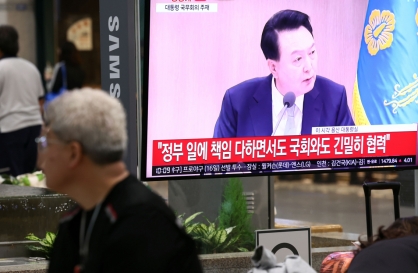[Editorial] Economic impact of war
As Russian conflict hits global economy, Korea has to take more steps to stem risks
By Korea HeraldPublished : Feb. 28, 2022 - 05:30
Russia’s invasion of Ukraine has sparked a wave of dire warnings about the global economy, with financial markets jittery about increased volatility in energy prices and more unpredictable shocks coming from the conflict.
As with other countries tightly linked through the integrated supply chains and financial markets, South Korea is vulnerable to turbulence generated by the war in Ukraine.
The stakes are immensely high for Asia’s fourth-largest economy, which is struggling to recover from the prolonged pandemic amid deepening worries about higher inflation and surging commodity prices.
To overcome the mounting challenges, the Korean government and the business community should consider doubling their proactive measures, while trying to minimize negative impact from the conflict, regardless of whether it ends rather briefly or drags on for a long period of time.
With the fierce battle raging near Kyiv, the capital of Ukraine, the US and EU announced new financial sanctions aimed at punishing Russia for its aggression. Some Korean experts and media outlets have voiced concerns that economic and financial sanctions against the world’s 11th-largest economy and one of the biggest commodity producers, if expanded or extended, could lead to more pitfalls for Korean businesses.
On Thursday, US President Joe Biden announced sweeping export restrictions against Russia by expanding what is called Foreign Direct Product Rule, or FDRP. Under the measure, Korean companies in the semiconductor, automotive and electronic appliance industries would find themselves unable to ship products to Russia. If the situation worsens, major Korean businesses such as Samsung Electronics and Hyundai Motor that run production facilities in Russia, may have to consider pulling out of the country, which is widely expected to get isolated further.
A particularly worrisome development is that higher prices of oil, gas and raw material prices could send inflation shooting up at a faster pace. As oil briefly surged past $100 a barrel last week, gasoline price at the pumps in Seoul also spiked. For Korea, which relies heavily on imported energy, such volatility in energy prices adds to pressure on its economy and its citizens, affecting a wide range of sectors in a way that makes it hard for policymakers to map out countermeasures.
The Bank of Korea raised its 2022 inflation outlook to 3.1 percent, up from 2 percent it put out in November. It was the first time that the central bank hiked its inflation outlook above 3 percent since April 2012, reflecting the depth of rising consumer prices at home and soaring energy prices abroad.
But even the 3.1 percent of inflation might turn out to be optimistic in consideration of local political and business factors. With the presidential election slated for March 9 and the rapid spread of COVID-19 feared to undercut small businesses further, both the outgoing and incoming administrations are expected to spend more money. This may lead to more inflationary pressure, but the central bank might find it difficult to raise interest rates in a timely manner given that the escalating geopolitical risks from the Russia-Ukraine crisis might put a severe damper on the country’s economy.
Against this backdrop, the government should take more aggressive steps to help keep the market steady and safeguard companies from aftershocks from the war, especially tough sanctions against Russia that could impact Korean exporters.
It is encouraging that the government promptly announced financial support plans for exporters and importers which may suffer losses from Russia’s attack on Ukraine and monitoring of the supply chains involving energy and raw materials. But these measures are far from enough. More proactive steps are needed to deal with greater risks as the war plays out and sanctions take hold.
As with other countries tightly linked through the integrated supply chains and financial markets, South Korea is vulnerable to turbulence generated by the war in Ukraine.
The stakes are immensely high for Asia’s fourth-largest economy, which is struggling to recover from the prolonged pandemic amid deepening worries about higher inflation and surging commodity prices.
To overcome the mounting challenges, the Korean government and the business community should consider doubling their proactive measures, while trying to minimize negative impact from the conflict, regardless of whether it ends rather briefly or drags on for a long period of time.
With the fierce battle raging near Kyiv, the capital of Ukraine, the US and EU announced new financial sanctions aimed at punishing Russia for its aggression. Some Korean experts and media outlets have voiced concerns that economic and financial sanctions against the world’s 11th-largest economy and one of the biggest commodity producers, if expanded or extended, could lead to more pitfalls for Korean businesses.
On Thursday, US President Joe Biden announced sweeping export restrictions against Russia by expanding what is called Foreign Direct Product Rule, or FDRP. Under the measure, Korean companies in the semiconductor, automotive and electronic appliance industries would find themselves unable to ship products to Russia. If the situation worsens, major Korean businesses such as Samsung Electronics and Hyundai Motor that run production facilities in Russia, may have to consider pulling out of the country, which is widely expected to get isolated further.
A particularly worrisome development is that higher prices of oil, gas and raw material prices could send inflation shooting up at a faster pace. As oil briefly surged past $100 a barrel last week, gasoline price at the pumps in Seoul also spiked. For Korea, which relies heavily on imported energy, such volatility in energy prices adds to pressure on its economy and its citizens, affecting a wide range of sectors in a way that makes it hard for policymakers to map out countermeasures.
The Bank of Korea raised its 2022 inflation outlook to 3.1 percent, up from 2 percent it put out in November. It was the first time that the central bank hiked its inflation outlook above 3 percent since April 2012, reflecting the depth of rising consumer prices at home and soaring energy prices abroad.
But even the 3.1 percent of inflation might turn out to be optimistic in consideration of local political and business factors. With the presidential election slated for March 9 and the rapid spread of COVID-19 feared to undercut small businesses further, both the outgoing and incoming administrations are expected to spend more money. This may lead to more inflationary pressure, but the central bank might find it difficult to raise interest rates in a timely manner given that the escalating geopolitical risks from the Russia-Ukraine crisis might put a severe damper on the country’s economy.
Against this backdrop, the government should take more aggressive steps to help keep the market steady and safeguard companies from aftershocks from the war, especially tough sanctions against Russia that could impact Korean exporters.
It is encouraging that the government promptly announced financial support plans for exporters and importers which may suffer losses from Russia’s attack on Ukraine and monitoring of the supply chains involving energy and raw materials. But these measures are far from enough. More proactive steps are needed to deal with greater risks as the war plays out and sanctions take hold.
-
Articles by Korea Herald







![[From the Scene] Monks, Buddhists hail return of remains of Buddhas](http://res.heraldm.com/phpwas/restmb_idxmake.php?idx=644&simg=/content/image/2024/04/19/20240419050617_0.jpg&u=20240419175937)








![[From the Scene] Monks, Buddhists hail return of remains of Buddhas](http://res.heraldm.com/phpwas/restmb_idxmake.php?idx=652&simg=/content/image/2024/04/19/20240419050617_0.jpg&u=20240419175937)

![[KH Explains] Hyundai's full hybrid edge to pay off amid slow transition to pure EVs](http://res.heraldm.com/phpwas/restmb_idxmake.php?idx=652&simg=/content/image/2024/04/18/20240418050645_0.jpg&u=20240419100350)

![[Today’s K-pop] Illit drops debut single remix](http://res.heraldm.com/phpwas/restmb_idxmake.php?idx=642&simg=/content/image/2024/04/19/20240419050612_0.jpg&u=)